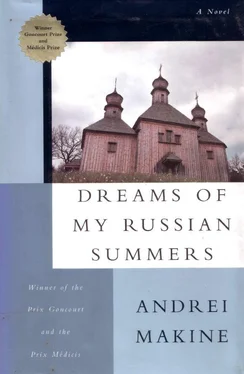From being a respectable doctor's wife, known in the entire town, Albertine had become transformed into a most strange widow – a Frenchwoman who seemed to find it hard to make up her mind to return to her country. Worse still, each time she came back again!
She was still too young and too beautiful to avoid the malicious gossip of Boyarsk society. Too unusual to be accepted as she was. And soon too poor.
Charlotte noticed that after each trip to Paris, they settled into smaller and smaller apartments. At the school where she had been admitted, thanks to a former patient of her father's, she quickly became "that Lemonnier." One day her teacher made her come to the blackboard – but not to test her… When Charlotte stood before her, the lady looked at the little girl's feet and, with a disdainful smile, asked, "What do you have on your feet, Mademoiselle Lemonnier?"
The thirty pupils rose from their seats, craning their necks and staring. On the well-polished parquet floor they saw two woolen coverings, two "shoes" that Charlotte had concocted herself. Crushed by all these stares, Charlotte lowered her head and involuntarily screwed up her toes inside the socks, as if she wanted to make her feet disappear…
At that time they lived in an old izba on the outskirts of the town. Charlotte was no longer surprised to see her mother almost always stretched out upon a high peasant bed behind a curtain. When Albertine got up, the black shadows of dreams seethed in her eyes, even though they were open. She no longer even tried to smile at her daughter. She dipped a copper ladle into a bucket, drank deeply, and went out. Charlotte already knew that they had been surviving for a long time thanks to the glitter of a few jewels in the case with the mother-of-pearl inlaid work…
She liked the izba , far from the fashionable districts of Boyarsk. Their poverty was less visible in these narrow, winding streets, buried under the snow. And it was so good, on returning from school, to climb up the old wooden steps that crunched under your feet; to pass through a dim entrance hall with walls made of great logs, which were covered in a thick coat of hoarfrost; and to push at the heavy door, which yielded with a brief, very lifelike groan. And there, in the room, one could remain for a moment without lighting the lamp, watching the little low window becoming suffused with the violet dusk, listening to snowy gusts of wind tinkling against the window-pane. Leaning back against the broad, hot flank of the big stove, Charlotte felt the heat slowly penetrating beneath her coat. She held her frozen hands to the warm stone – the stove seemed to her to be the enormous heart of this old izba . And beneath the soles of her felt boots the last lumps of ice were melting.
One day a splinter of ice broke beneath her feet unusually loudly. Charlotte was surprised – she had already been home a good half hour, all the snow on her coat and her shapka had long since melted and dried out. But this icicle… She bent down to pick it up. It was a splinter of glass! A very fine one, from a broken medical vial…
It was thus that the terrible word morphine entered her life. It explained the silence behind the curtain, the seething shadows in her mother's eyes, a Siberia absurd and inevitable as fate.
Albertine no longer had anything to hide from her daughter. From now on it was Charlotte who would be seen going into the pharmacy and murmuring timidly, "It's for Madame Lemonnier's medicine…"
She always returned home alone, crossing the vast wastelands that separated their cluster of houses from the last streets of the town, with its shops and lighting. Often a snowstorm would descend on these dead spaces. Tired of struggling against a wind laden with ice crystals, deafened by its whistling, one evening Charlotte stopped in the midst of this desert of snow, turning her back on the squalls, her gaze lost in the giddy flight of the snowflakes. She had an intense awareness of her own life, the warmth of her thin body concentrated into a minuscule "I." She felt the tickling of a drop that crept under the earflap of her shapka , and the beating of her heart, and next to her heart – the fragile presence of the vials she had just bought. "It's me," a muffled voice suddenly rang out inside her, "I, who am here in these snow squalls at the end of the world, in this Siberia, I, Charlotte Lemonnier; I, who have nothing in common with this ' barbarous place, not with this sky, nor with this frozen earth. Nor with these people. Here I am, all alone, taking morphine to my mother…" It seemed as if her mind were reeling before tipping over into an abyss, where all this absurdity, suddenly perceived, would become natural. She shook herself. No, this Siberian desert must end somewhere, and at that place there was a city, with broad avenues lined with chestnut trees, lighted cafés, her uncle's apartment, and all those books that began with such dear words utterly beloved simply for the way their letters looked. There was France…
The city with chestnut-lined avenues was transformed into a fine spangle of gold that glittered in her eyes, but nobody noticed. Charlotte could even glimpse its brilliance in the reflection of a beautiful brooch on the dress of a young lady with a capricious and haughty smile: she was sitting in a fine armchair in the middle of a large room with elegant furniture and silk cushions at the windows. "La raison du plus fort est toujours meilleure," recited the young woman in a pinched voice.
"… est toujours la meilleure," Charlotte corrected discreetly and, with lowered eyes, added, "It would be more correct to pronounce it 'meilleure' and not 'meillaire.' 'Meill-eu-eure.' "
She rounded her lips and made the sound last until it was lost in a velvety "r." The young orator, with a sullen expression, resumed her declamation. This was the daughter of the governor of Boyarsk. Charlotte gave her French lessons every Wednesday. She had initially hoped that she might become the friend of this very well groomed adolescent, hardly older than herself. Now, no longer hoping for anything, she endeavored simply to give a good lesson. Her pupil's swift, scornful glances did not find their mark anymore. Charlotte listened to her, intervening from time to time, but her gaze was lost in the glitter of the beautiful amber brooch. Only the governor's daughter was allowed to wear an open-collared dress at school, with this adornment at its center. Conscientiously, Charlotte pointed out all the mistakes of pronunciation or grammar. And from the gilded depths of the amber arose a city with beautiful autumn foliage. She knew that for a whole hour she would have to bear the little grimaces of this great, plump, beautifully dressed child, and then, in the corner of the kitchen, receive from the hands of a maid her parcel, the leftovers from a meal; then she must wait in the street for a good opportunity to find herself alone with the pharmacist and murmur, "Madame Lemonnier's medicine, please…" The little puff of warm air stolen at the pharmacy would quickly be driven from under her coat by the icy blast of the wastelands.
When Albertine appeared at the top of the steps the cabdriver raised his eyebrows and got up from his seat. He was not expecting this. The izba , with its sagging roof covered in moss; the worm-eaten flight of steps invaded by nettles. And especially not in this village, with its street buried under gray sand…
The door opened, and in its twisted frame there appeared a woman. She wore a long, extremely elegantly cut dress, such as the cabdriver had only seen on the fine ladies coming out of the theater in the evening right at the center of Boyarsk. Her hair was gathered up in a chignon; it was crowned with a large hat. The springlike wind fluttered the veil that was thrown back on the broad, gracefully turned-up brim.
Читать дальше












